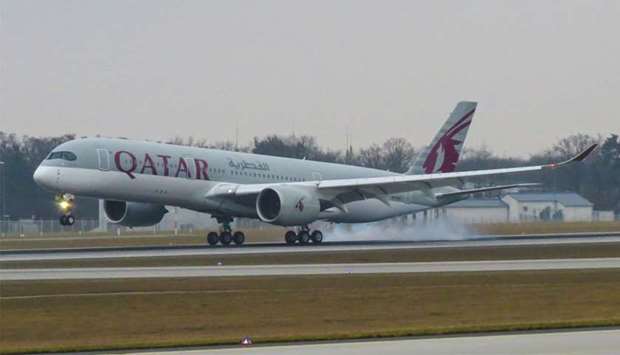Qatar Airways has come out as the leading Middle East airline according to global consumer sentiment on social media. The findings formed part of a broader research study to understand global public sentiment towards the leading airlines in the region and the factors driving it.
The research conducted by BrandsEye on behalf of the aerospace division of the Toulouse MBA programme analysed the social media universes of four major Middle Eastern airlines - Qatar Airways, Etihad, Emirates and Saudi Arabian Airlines (Saudia), with over half a million online mentions in both English and Arabic captured between March and May 2017.
After collection, the data was first broken down using proprietary artificial intelligence techniques. A further layer of accuracy was then added through the use of the crowd - a group of trained contributors who provided human analysis and understanding to the social data achieve a confidence level of 95% with a margin of error of 2.15%, ensuring the data represented the true feelings of the global public.
The three top airlines in the study - Emirates, Qatar and Etihad, all excelled with overwhelmingly positive sentiment.
According to BrandsEye, “Qatar was the most popular airline based on sentiment” with 44% positive conversation and 9% negative, compared to Emirates with 39% positive and 16% negative, ahead of Etihad with 31% positive and 16% negative.
The most spoken about airline was Emirates with 243,633 mentions, followed by Qatar at 165,276, Etihad at 78,705 and Saudia 49,447.
Importantly, although Qatar Airlines edged out both Emirates and Etihad, all three airlines performed strongly over the period. Such findings dovetail further with Skytrax’s awarding of Qatar Airways best airline for 2017, with Emirates and Etihad also featuring in the top 10.
A unique element of the study included a topic analysis, which unpacked the key topics impacting sentiment towards the airlines. Of the elements contributing towards a good or bad flying experience, aesthetics, ethics, and in-flight amenities were the topics referenced most often by online authors, with each subject making up 10% of the overall discussion.
Conversations related to staff claimed a 9% share, while airport experience, brand, and response time each took 8%. In-flight service and baggage handling had shares of 7% and 6% respectively. Pricing and special offers/promotions each contributed 5% towards the overall topic analysis.
Opinion data was analysed for topics towards each airline to understand factors impacting both positive and negative sentiments.
Qatar Airways was the top performer, followed by Emirates and Etihad, which backed up the overall sentiment ranking towards the airlines.
“By contrast, of the four carriers, Saudia had generally negative sentiment towards it and performed poorly across a number of key topics,” BrandsEye said.
On June 5, political sanctions were imposed on Qatar. To assess the impact that a major global incident would have on an airline, BrandsEye extended its research to track conversations to Qatar Airlines during the month of June.
In total, Qatar Airways received 112,095 mentions during that time, a substantial amount of chatter - 68% of the volume the airline had received during the previous three months combined.
Conversations spiked during the first four days of the crisis, during which time the brand was mentioned over 35,000 times, with the majority of mentions linked to the impact that the sanctions were having on those flying with the airline.
The airline did experience a shift in sentiment on June 20, following the announcement of the airline winning Skytrax’s best airline in the world. Positive sentiment was also driven by the launch announcement of the new ‘QSuite’ at the Paris Airshow and various promotions run by the airline on June 20.
With airspace and certain offices closed, Qatar Airways was forced to cancel a large number of flights and introduce refund procedures for those impacted. Despite an initial decline in positive sentiment around the incident - part of which arose off the back of the airline’s initial delay in responding to flight cancellations and requests for refunds - by June 13, the airline’s reputation had recovered, highlighting the value of a strong brand and effective crisis planning.
Despite the brief period during which positive sentiment declined, the airline ended June with 38% positive sentiment for the month: 6% behind its three-month average of 44%.
Moreover, its 12% negative sentiment was 3% less than its average score for the April - June period.
“The study appears to show that for top performer Qatar Airways, consistently pleasing consumers has meant that the airline has been able to not only come out as a favourite among the public, but has been able develop a high degree of brand resilience, rapidly bouncing back from this possible PR crisis,” BrandsEye said.
Simple tallies of followers and online mentions are a blunt tool - reputation strength hinges on brands’ ability to deliver consistently across a wide range of areas. In the case of airlines, everything from customer service to aesthetics plays a part in the overall strength of the brand.
“Given their strong performances over a range of topics and high overall positive sentiment levels, it’s unsurprising that three of the airlines in the study - Qatar Airways, Emirates and Etihad - are among the world’s top carriers. The study highlights that although quantity of mentions is important, it is the quality of engagement which separate the good from the great,” BrandsEye said.



